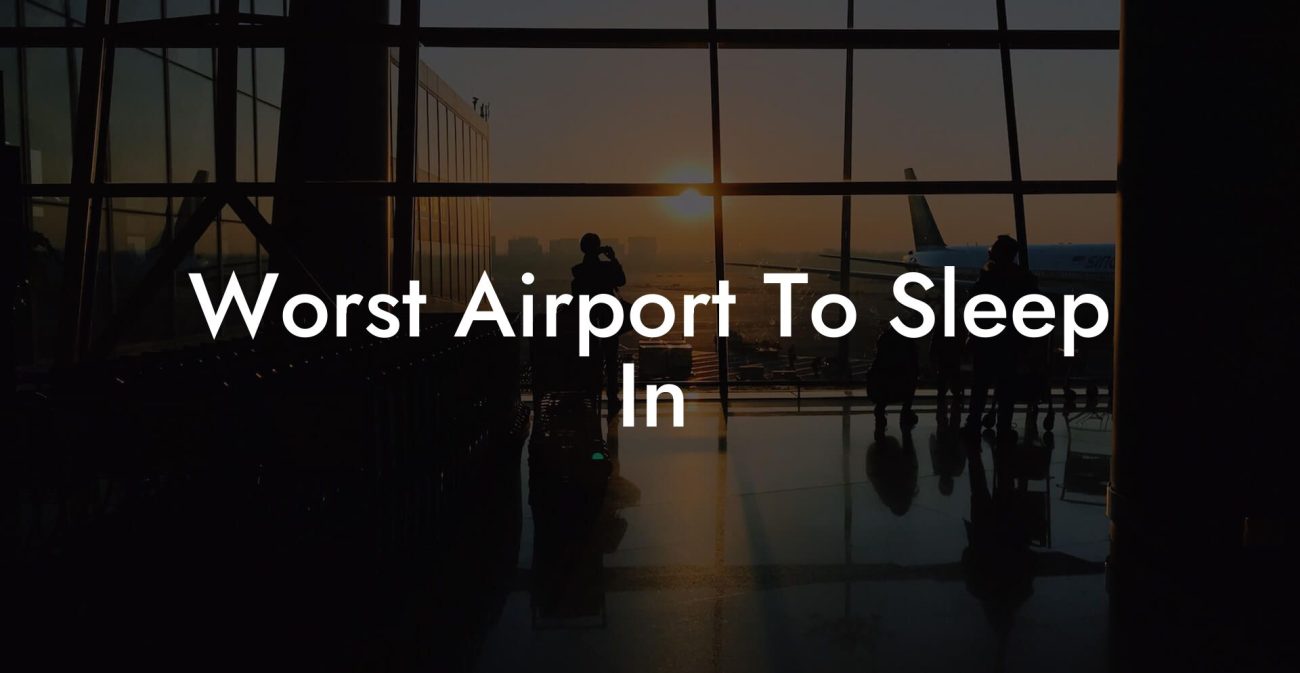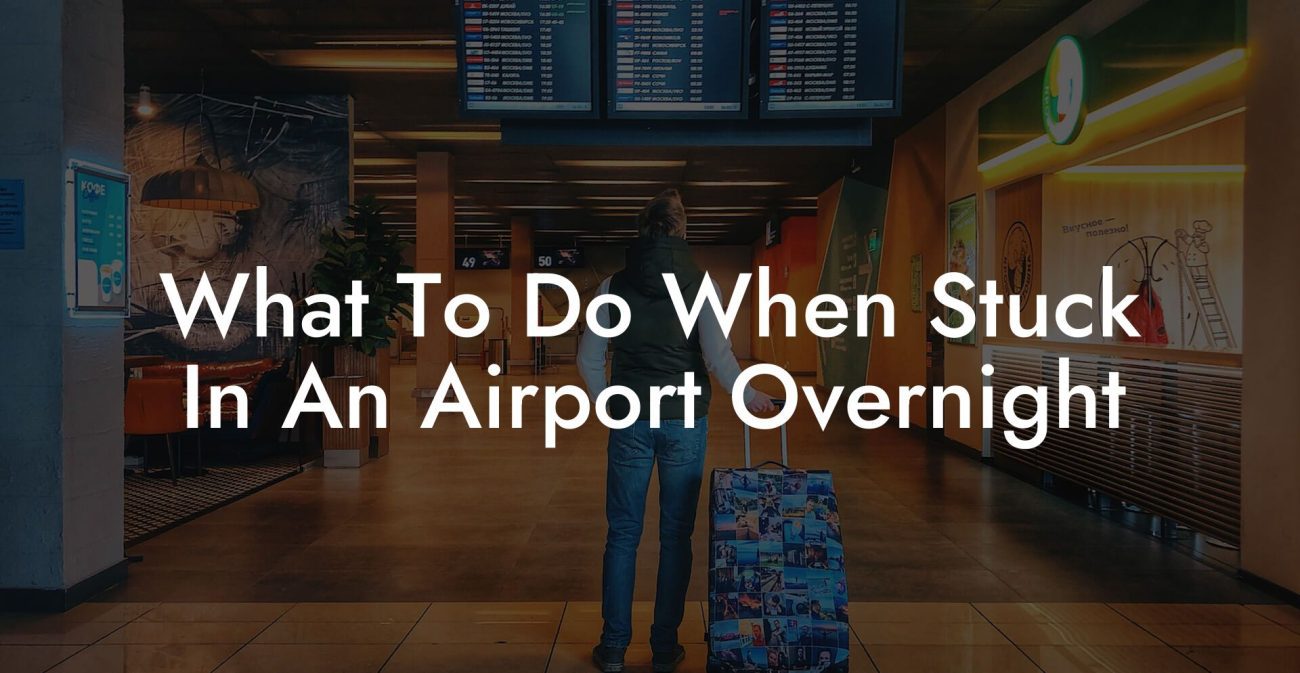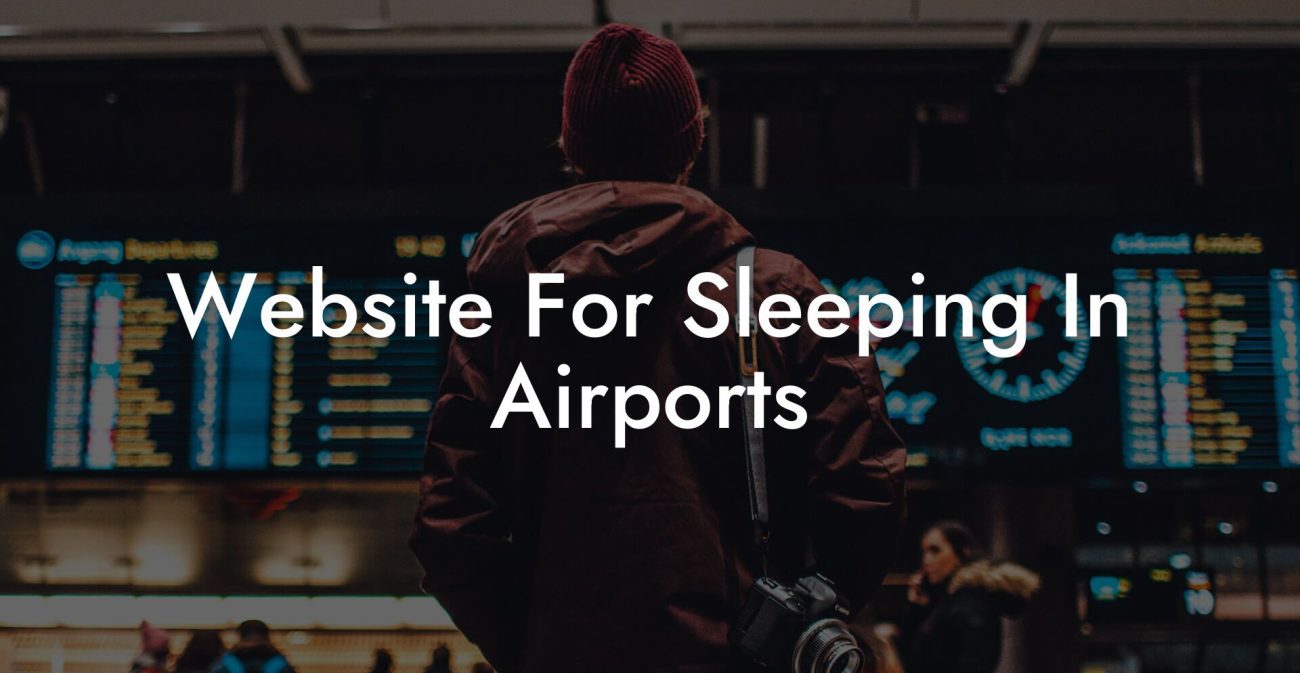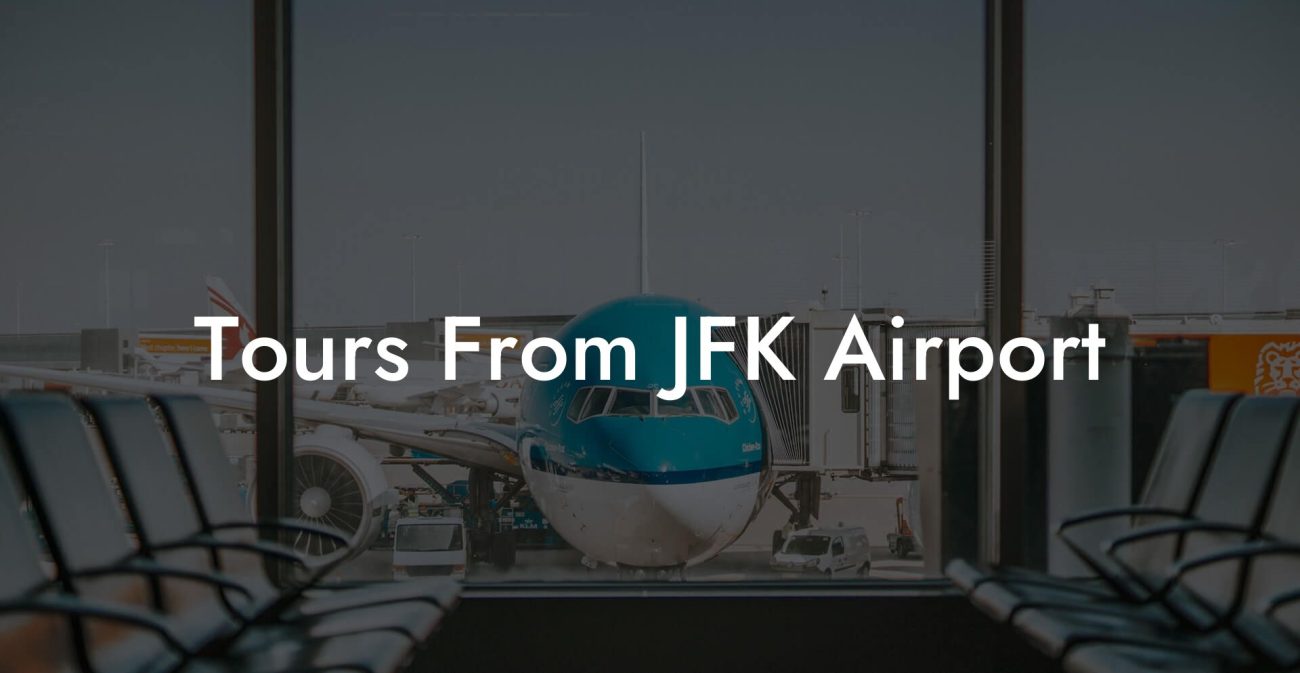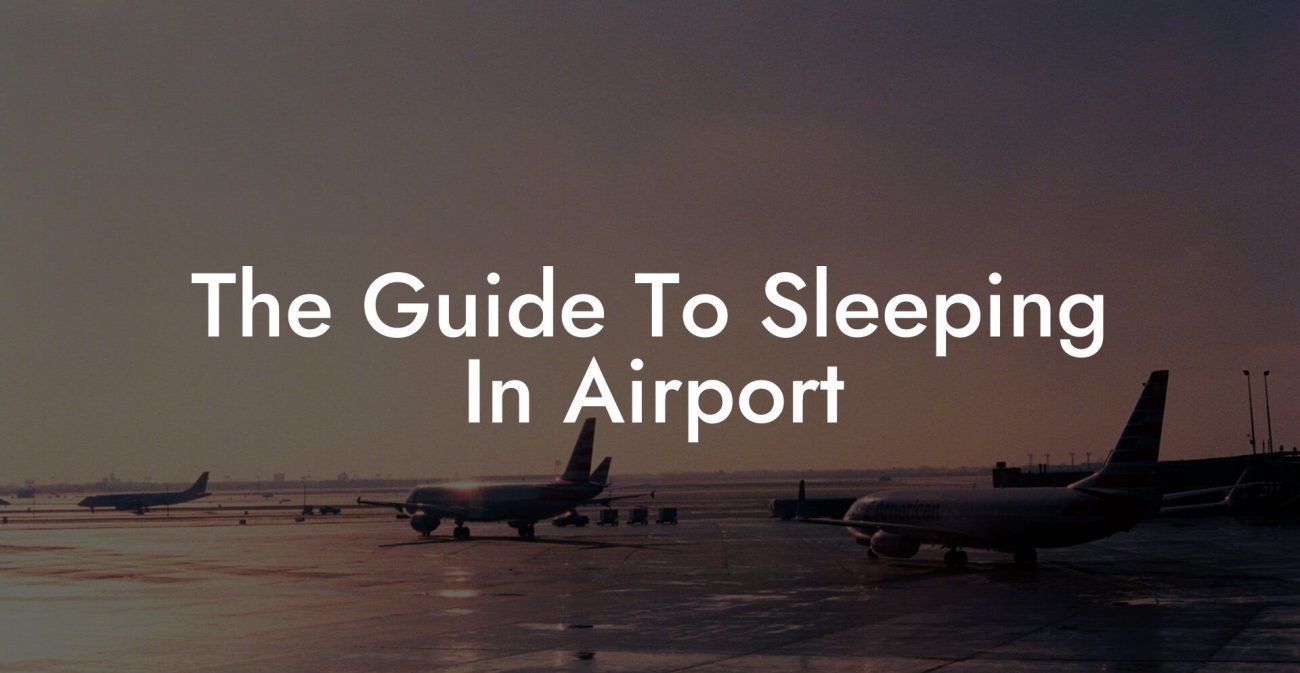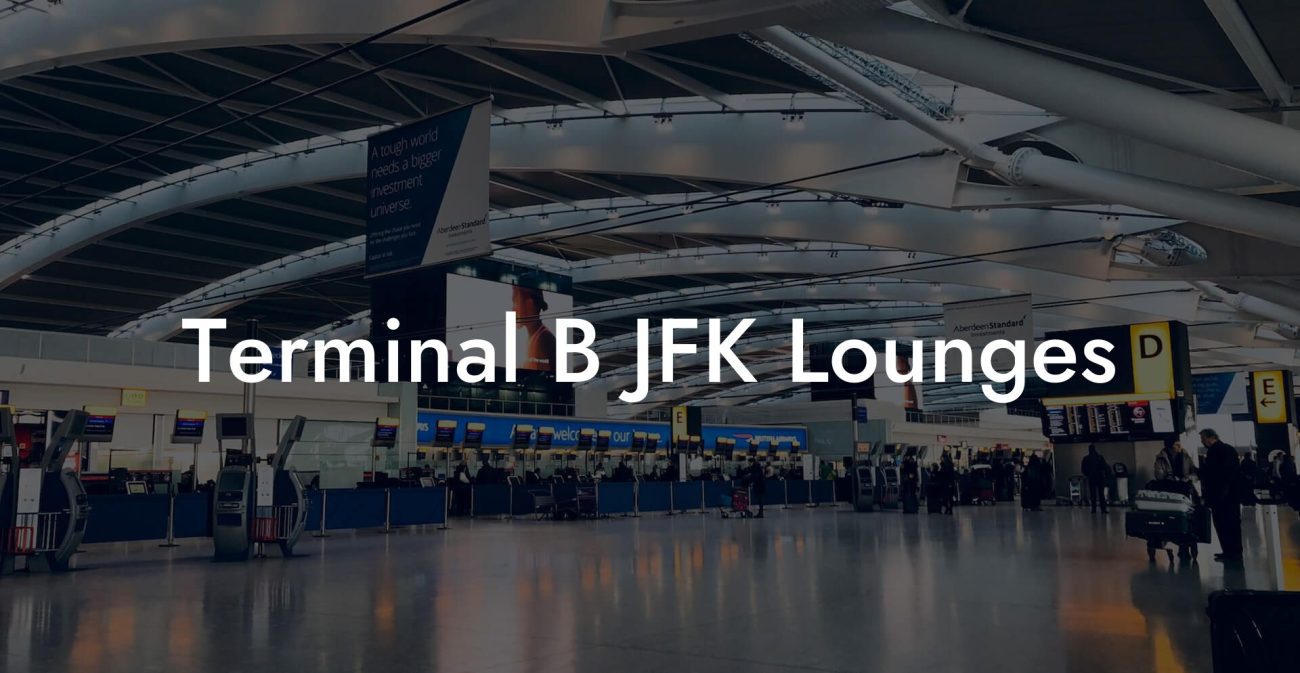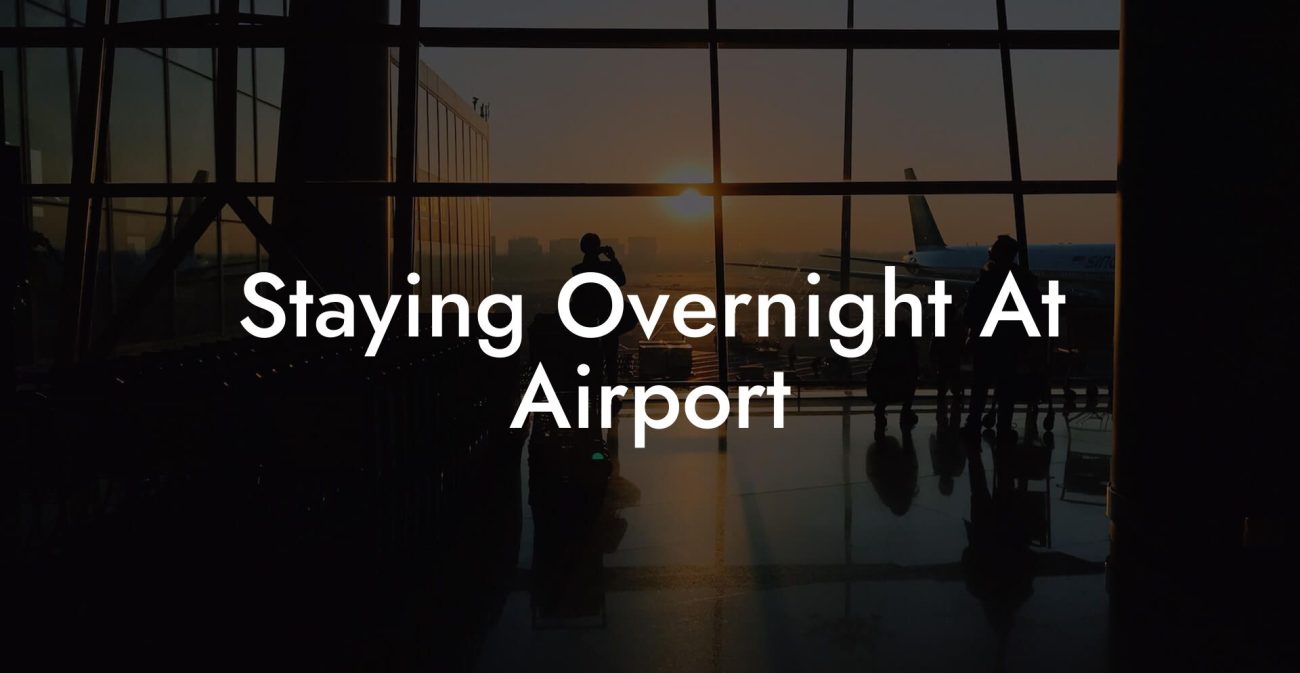Ever found yourself sprawled unceremoniously on a hard bench in a bustling airport terminal, wondering if sleep is just a myth in this concrete jungle? You’re not alone. In an era where long layovers and delayed flights have become the norm, the question “Can You Sleep In Airports?” has sparked a travel revolution—think impromptu naps in comfy airport sleeping pods, innovative transit lounges, and even secret nooks that make 30 hours on layover seem like a breeze.
Quick Links to Useful Sections
- The Evolution of Airport Sleeping: From Hard Benches to High-tech Pods
- The Art of Sleeping in Airports: Mastering These Tips and Tricks
- Exploring the Best Airport Sleeping Spots: Hidden Gems and Travel Hacks
- Airport Lounges and Transit Hotels: Elevating Your Sleep Experience
- Safety and Comfort: How to Prepare for a Night at the Terminal
- Sleep Gear Essentials: What to Pack for Your Airport Nap
- Real-Life Stories: Travelers Who Conquered the Airport Sleep Challenge
- Tech-Savvy Tips: Apps and Resources for the Modern Airport Sleeper
- Resources and Community Support: Your Next Steps
- Airport Sleeping Myths Debunked: What Really Works?
- Your Journey to Restful, Recharged Airport Adventures
- Frequently Asked Questions About Sleeping in Airports
- The Future of Airport Sleeping: Trends and Innovations
- Embrace the Journey: Redefine Your Airport Sleep Experience
The Evolution of Airport Sleeping: From Hard Benches to High-tech Pods
Remember the days when a long layover meant a grueling night on a cold, uncomfortable bench? Gone are those days, thanks to the modern reinvention of airport sleeping spaces. Today, airports around the globe are rolling out red carpets (or at least cushioned mats) for travelers who need to catch some quality zzz’s between flights.
From the humble beginnings of makeshift blankets and awkward corner naps to the introduction of sleek and innovative airport sleeping pods, the evolution has been nothing short of remarkable. These high-tech sleep havens are designed to offer privacy, comfort, and even a little bit of luxury—perfect for Gen Z and millennial travelers who demand both functionality and style.
More than just a trend, airport sleeping pods are a response to the dynamic lifestyle of modern travelers. With increased demand for convenient napping options, many airports have embraced this concept. Imagine a futuristic space where noise-cancelling technology, mood lighting, and adjustable temperatures come together to create your personal sleep oasis—right in the heart of a bustling terminal.
Whether it’s a quick power nap before a long haul or a refreshing break during an extended layover, the idea of sleeping in airports has gained credibility, innovation, and a loyal following among digital nomads and travel enthusiasts alike.
The Art of Sleeping in Airports: Mastering These Tips and Tricks
So, can you sleep in airports? Absolutely—but like any good skill, it takes a blend of strategy, preparation, and a dash of courage. Think of it as a form of urban survival where comfort meets ingenuity.
First, scouting the right spot is key. Many travelers swear by quiet, out-of-the-way corners in the terminal, while others prefer the comfort of designated nap zones. A little research beforehand using apps like “SleepWell” or even casual tips from fellow travelers can be the secret sauce to finding that perfect sleep corner.
Next, consider investing in a reliable travel pillow and a lightweight blanket—the unsung heroes behind many a successful airport nap. These compact sleep gear essentials not only provide comfort but also help insulate you against the ever-present hum of airport activity.
Additionally, don’t underestimate the power of earplugs or noise-cancelling headphones. With the constant buzz of announcements and chatter, creating your own serene bubble can be a game-changer. Pro tip: pre-download some ambient soundtracks or white noise apps to drown out the chaos and lull you into dreamland.
And hey, if you’re looking to truly elevate your airport sleeping experience, why not scout out an airport lounge or a transit hotel? These alternatives often combine comfort with privacy, giving you that coveted five-star sleep experience—even if you’re not exactly off-duty.
Exploring the Best Airport Sleeping Spots: Hidden Gems and Travel Hacks
When it comes to discovering the best airport sleeping spots, not all terminals are created equal. Some of the world’s busiest hubs have mastered the art of hospitality, offering travelers secret spots to relax, nap, and even recharge their devices.
For instance, airports like Singapore Changi, Helsinki-Vantaa, and Tokyo Haneda are renowned for their designated sleep zones—areas that feature comfy seating, ambient lighting, and minimal noise. These sleep-friendly sanctuaries often include reclining chairs and even mini sleeping pods that feel like a cross between a futuristic hotel room and a capsule hotel.
But don’t let the big names intimidate you. Even mid-size or smaller airports often hide little-known corners where you can catch up on sleep. Look for quiet corridors near less-traveled gates or even behind security checkpoints that seldom see the hustle and bustle of boarding rushes. A little discretion and a resourceful approach can turn any airport into your personal nap haven.
One of the coolest trends is the rise of airport apps that map out these hidden gems for you. With geo-tagged reviews and insider tips, these digital guides can be a lifesaver. The next time you’re in transit, simply check your favorite travel app for the “sleep” filter and unlock your gateway to a peaceful respite amid travel chaos.
Remember, it’s all about perspective. An airport isn’t just a transit point—it’s a dynamic space filled with opportunities to transform mundane waiting time into memorable restful experiences.
Airport Lounges and Transit Hotels: Elevating Your Sleep Experience
For those moments when the terminal vibe just won’t cut it, airport lounges and transit hotels can really elevate your sleep game. These spaces are designed to be more than just a pit stop; they’re a haven where comfort, privacy, and even a bit of luxury converge.
Many airport lounges cater to business travelers, but a growing number are now accessible to a broader audience through paid passes or day memberships. These lounges offer amenities like plush seating, complimentary snacks and beverages, high-speed Wi-Fi, and, importantly, quiet rooms for catching some shut-eye. Imagine sinking into a deep beanbag chair in a lounge with ambient music softly playing in the background—it’s like a mini retreat before your next flight.
If you’re looking for a more private option, check out transit hotels. Often nestled within major international terminals, transit hotels provide private rooms equipped with comfy beds, en-suite bathrooms, and sometimes even shower facilities. They’re perfect for those layovers that stretch into night, allowing you to sleep like a baby without the hassle of exiting and re-entering the airport.
One tip: if you’re traveling on a budget, keep an eye on deals or membership programs that offer discounted access to both lounges and transit hotels. With a little savvy planning, you can upgrade your airport sleep experience without breaking the bank.
Ultimately, whether you opt for a high-tech sleeping pod in a busy terminal, a serene airport lounge, or a cozy transit hotel, the ultimate goal is simple: reclaim your rest and transform travel fatigue into genuine relaxation.
Safety and Comfort: How to Prepare for a Night at the Terminal
Let’s face it—sleeping in an airport, while often necessary, comes with its own set of challenges. Safety and comfort should always be at the forefront of your planning, especially when you’re spending a few hours (or even an entire night) in a public space.
Start by scouting the terminal ahead of time. Use airport maps and travel forums to get a sense of the layout, and pinpoint potential sleeping spots that are well-lit yet quiet, and importantly, safe. Look for areas that are under surveillance and near staff if you ever need assistance or an extra set of eyes on your belongings.
Next, invest in some practical travel gear. A sturdy travel lock for your bag, a discreet money belt, and even a copy of your important documents can give you peace of mind as you doze off in a public space. Maintaining situational awareness is key—if something feels off, trust your instincts and relocate.
Comfort-wise, layering is your best friend. Airports can be unpredictable when it comes to temperature, so pack a lightweight sweater or cardigan along with your travel blanket. A comfortable neck pillow and an eye mask will also help create a mini cocoon of serenity amid the terminal’s hustle and bustle.
Lastly, consider your digital security. Keep your devices charged and use a portable battery, and always set your phone to airplane mode or activate a VPN if you plan to access sensitive information. In today’s connected world, protecting your data is as essential as protecting your sleep.
With these safety and comfort tips in your travel arsenal, you can approach an overnight airport sleep session not as a chore, but as an opportunity to master the art of living (and sleeping) on the go.
Sleep Gear Essentials: What to Pack for Your Airport Nap
When it comes to catching some rest in an airport, packing the right sleep gear can make all the difference. Whether you’re a seasoned frequent flyer or a novice navigating a long layover, having a travel kit tailored for comfort is essential.
Let’s break down the must-haves:
- Travel Pillow: Choose one that offers neck support and is easy to carry. Memory foam pillows or inflatable variants work wonders in confined spaces.
- Eye Mask and Earplugs: Block out unwanted light and noise. Noise-cancelling headphones can double as earplugs while letting you enjoy your favorite sleep soundtrack.
- Lightweight Blanket or Scarf: Airports can be chilly, so a compact blanket or a large scarf can keep you warm without taking up too much space.
- Portable Charger: Keep your devices juiced up. A reliable power bank and charging cables are essential to stay connected and entertained during layovers.
- Ziplock Bags/Security Pouches: Use these to secure your travel documents, money, and other valuables while you nap.
- Comfortable Clothing: Opt for soft, stretchy clothes that don’t restrict your movement. Whether it’s a hoodie, leggings, or a loose tee, comfort is key.
Packing these essentials in a dedicated travel kit not only ensures you’re equipped for the occasional airport snooze but also reinforces the idea that you’re in control of your travel comfort. With the right gear by your side, even the busiest terminals can feel like a cozy retreat.
And remember, the goal isn’t just to sleep—it’s to make the most of your rest so you can recharge and tackle the next leg of your journey with energy and enthusiasm.
Real-Life Stories: Travelers Who Conquered the Airport Sleep Challenge
While all the tips and tricks sound great, nothing is more inspiring than real-life stories from travelers who have turned airport sleeping into an art form. These tales of adventure and ingenuity remind us that sleep isn’t confined to a traditional bed—it can be found anywhere, even amidst the chaos of a busy travel terminal.
Take Alex, for example—a digital nomad from Brooklyn who swears by the magic of airport sleeping pods. Facing a 12-hour layover in a major international hub, Alex decided to try out a newly launched sleeping pod. With its ambient lighting and ergonomic design, he not only managed to squeeze in a solid 3-hour power nap but also felt recharged enough to explore the airport’s art installations afterward.
Then there’s Jamie, a millennial adventurer who turned an unexpected flight delay into a mid-airport meditation session. Equipped with noise-cancelling headphones and a soft travel blanket, Jamie found a quiet corner near a secluded gate. What began as a forced halt developed into a rejuvenating moment of self-care—the perfect blend of mindfulness and rest during travel chaos.
Stories like these resonate with anyone who’s had to improvise their sleep setup under less-than-ideal circumstances. They remind us that sleep is not about the location—it’s about the mindset. With creativity, careful planning, and a touch of humor, these travelers have mastered the art of repurposing airport spaces into mini sanctuaries.
Whether it’s a high-tech sleeping pod or a hidden corner of a terminal, the lessons from these adventurers are clear: with the right attitude, you can transform even the most hectic travel day into a refreshing experience.
Tech-Savvy Tips: Apps and Resources for the Modern Airport Sleeper
In our digital age, technology isn’t just about entertainment—it’s your trusty sidekick when it comes to navigating airport sleep. Several apps and online resources have emerged to help you pinpoint the best sleeping spots, monitor flight changes, and even manage your sleep schedule on the go.
For instance, apps like “SleepWell,” “NapAdvisor,” and “Airport Sleep Finder” offer user-generated reviews and heat maps of popular napping areas, from quiet lounges to secluded corners. Their real-time updates mean you’re never caught off guard by unexpected noise or crowd surges.
Additionally, flight tracking apps keep you informed about delays or gate changes, so you know exactly how much time you have to catch some shuteye. Pair these with digital alarm apps and meditation guides, and suddenly, a long layover doesn’t seem quite so daunting.
And for those who love to share their travel hacks, online communities on platforms like Reddit, Instagram, and dedicated travel forums are treasure troves of insider tips. From detailed reviews of airport lounges to top recommendations for comfy napping spots, these digital spaces are where modern airport sleepers unite.
With technology at your fingertips, turning an airport into your personal snooze station becomes not only feasible but also fun. So, next time you find yourself in a terminal with hours to kill, fire up your favorite travel app and discover a world of sleep possibilities.
Resources and Community Support: Your Next Steps
Ready to make the most of your next layover? Whether you’re a seasoned traveler or just embarking on your adventures, tapping into community resources can revolutionize your airport sleep routine. Numerous blogs, forums, and social media groups are dedicated to unraveling every secret of airport sleeping—from hardware recommendations to the latest news on transit hotels.
Don’t hesitate to reach out to travel communities on platforms like TripAdvisor, Reddit’s r/travel, or even Instagram hashtags such as #airportsleep. These platforms offer firsthand accounts, reviews, and even booking tips for places that might be flying under the radar.
Additionally, consider subscribing to travel newsletters and blog updates that focus on airport amenities and travel hacks. With weekly insights and expert advice, you’ll never miss out on new sleeping pods, lounges, or life-saving tips on how to navigate airport rest.
Most importantly, remember that every traveler’s journey and sleep style is unique. Whether you crave a quiet corner with ambient tunes or a bright, structured sleeping pod with high-tech convenience, the community is there to support your quest for better sleep on the move.
Start your next adventure by gathering the tools, tips, and support you need to sleep like a pro in airports. Share your experiences, learn from fellow jet-setters, and pave the way for a new era of travel where fatigue is tamed, and sleep is accessible—even in the busiest terminals.
Airport Sleeping Myths Debunked: What Really Works?
There are plenty of myths floating around about sleeping in airports. Some say the noise is unbearable, others claim that no amount of travel gear can turn a busy terminal into a crib-like haven. Let’s break down these misconceptions and set the record straight.
Myth #1: You Can’t Get Any Quality Sleep in an Airport
Reality: With the right tools and a bit of creativity, even the busiest airport can offer pockets of peace. Whether it’s finding a designated sleeping area or using tech gadgets to block out distractions, quality sleep is absolutely within reach.
Myth #2: Airport Sleeping Is Unsafe
Reality: By staying vigilant and choosing well-monitored spots, you can keep your belongings secure while enjoying a nap. Many major airports have security measures in place, making them safer than you might expect.
Myth #3: Only Frequent Flyers Can Master It
Reality: Whether you’re a business traveler or an occasional vacationer, the skills needed for successful airport napping can be learned. With a little practice and some insider tips, anyone can transform a layover into a cherished rest period.
Dispelling these myths not only empowers you to make the most of your travel time but also encourages a mindset that embraces rest as an essential part of the journey. With confidence and the right know-how, sleeping in airports transforms from an inevitability into a well-honed art form.
Your Journey to Restful, Recharged Airport Adventures
At its core, the idea of sleeping in airports is about more than just battling travel fatigue—it’s about reclaiming control over your travel experience, knowing that rest (and a bit of ingenuity) can turn even the longest layovers into restorative breaks. Embracing innovative solutions like airport sleeping pods, high-tech lounges, and creative napping setups puts you in the driver’s seat of your journey.
So next time you’re faced with a delayed flight or an overly long connection, remember that a little preparation and an open mindset can transform a potentially stressful situation into a moment of serene escapism. With the right tools, insights, and a thriving community at your side, you’re ready to take your airport sleep game to unprecedented heights.
As you navigate the world of airport sleeping, let every tip, every shared story, and every trusted app guide you toward a new era of travel wellness. After all, the journey is just as important as the destination, and sometimes, the best memories are made in those quiet, unexpected moments amid the runway rush.
Embrace the adventure, trust your instincts, and let your inner traveler know that a well-earned nap in an airport isn’t just possible—it’s an opportunity to recharge, reflect, and conquer the skies.
Frequently Asked Questions About Sleeping in Airports
Below are some of the most common questions travelers ask about sleeping in airports, along with straightforward answers to help you navigate your next travel adventure.
1. Can you really sleep in airports without feeling unsafe?
Yes, you can. By choosing well-lit, monitored areas and staying aware of your surroundings, many travelers find safe and comfortable spots to nap, even in busy terminals.
2. What are airport sleeping pods, and how do they work?
Airport sleeping pods are compact, futuristic napping spaces designed to offer privacy and comfort. They often come with features like adjustable lighting, temperature control, and even noise reduction, making them a modern solution for long layovers.
3. Are airport lounges a better option than sleeping on a bench?
Absolutely. Airport lounges typically provide amenities like soft seating, complimentary food and drinks, and quiet zones—making them a premium option for travelers seeking enhanced comfort and rest.
4. What essential items should I pack for an airport nap?
A travel pillow, an eye mask, earplugs or noise-cancelling headphones, a lightweight blanket, and a portable charger are among the top essentials to ensure maximum comfort and safety during your airport sleep session.
5. How can I find the best sleeping spots in an unfamiliar airport?
Use travel apps and forums that detail airport layouts and offer insider tips. User reviews on platforms like Reddit or dedicated travel blogs can provide up-to-date insights about the quietest and most comfortable rest areas.
6. Is it necessary to book a transit hotel during lengthy layovers?
Not necessarily. For many, designated sleeping spots or airport lounges will suffice. However, if you prefer more privacy and a hotel-like experience, transit hotels offer private rooms and are an excellent option.
7. Can these tips be applied internationally, or are they just for U.S. airports?
They apply globally. Airports around the world are increasingly incorporating sleep-friendly features, so many of these tips will serve you whether you’re traveling in Asia, Europe, or the Americas.
The Future of Airport Sleeping: Trends and Innovations
As air travel continues to innovate, the future of airport sleeping looks brighter than ever. Designers and architects are incorporating futuristic elements—think smart lighting, temperature-controlled pods, and even virtual reality zones that simulate a home-like environment. These trends are particularly appealing to tech-savvy millennials and Gen Z travelers hungry for experiences that go beyond the ordinary.
Innovations in sleep technology extend beyond just comfort. Some airports are testing biometric sleep stations that monitor and adjust to your body’s needs, ensuring that every nap is optimized for efficiency. With advancements in sustainable design, many of these sleep solutions also embrace eco-friendly materials, aligning with the values of a generation that cares deeply about the planet.
In addition to high-tech sleeping pods, we’re also witnessing a surge in digital integration. Mobile apps will soon be able to not only locate the best napping spots but also offer real-time stress management tips and personalized sleep suggestions based on your travel schedule. The convergence of technology with sleep comfort holds exciting promise for reshaping the layover experience.
Looking further ahead, the concept of ‘sleep lounges on demand’ might become a reality, where travelers can reserve a quiet, comfortable space in minutes via an app. This seamless integration of technology and comfort is set to revolutionize the way we perceive travel downtime, making airport sleep an anticipated service rather than a last resort.
As these trends take off, one thing is clear: the future of airport sleeping is not just about catching a few Z’s; it’s about reimagining travel as a holistic experience where rest, technology, and innovation meet to transform layovers into something extraordinary.
Embrace the Journey: Redefine Your Airport Sleep Experience
From humble beginnings to high-tech sleeping pods and cozy lounges, the option to sleep in airports is evolving. Today’s travelers have an array of options to recharge during long layovers, combining practical tips, innovative gear, and the community’s shared wisdom. Whether you’re a night owl or a power nap champion, the tools to transform a transient space into a cozy retreat are at your fingertips.
Embracing flexibility, creativity, and a touch of humor, you can flip the script on the typical airport experience. Instead of dreading the long waits and fatigue, see each layover as an opportunity to experiment with new comforts and rest strategies. With every nap, you’re not only recharging your device but also your mind and spirit—ready to take on the next adventure with gusto.
Let the next time you step into an airport be a celebration of innovative travel hacks and self-care. Equip yourself with the right gear, dive into digital resources, and connect with fellow travelers who are redefining what it means to sleep on the go. After all, every journey deserves its moments of rest—moments that prepare you to conquer new destinations with energy and style.
So, pack your travel pillow, set your alarm, and get ready for a new chapter in the art of airport sleeping. Your journey to restful, recharged airport adventures starts now!
Useful Interruption: Dive deeper into the world of airport sleeping guides with our most popular sections. If there is anything you think is missing or anything you would love for us to write about, just give us a shout.
- General Airport Sleeping Guides
- Travel Gear & Equipment Recommendations
- Regional and Airport-Specific Guides
- Airport Sleeping Pods & Reviews
- Health, Safety, and Comfort Tips for Airport Sleepers
Last week, I decided to try the world-famous "airport sleepover" experience. Imagine this: I'm lying on a bench in Terminal C, surrounded by suitcases that have seen more of the world than I ever will, and a PA system that sounds like a karaoke machine on a sugar rush. I pull out my travel pillow—which, by the way, is more like a sad deflated balloon—and declare, "Tonight, I’m the king of this terminal!"
Soon enough, fellow travelers become my unexpected audience. One guy, fresh off a red-eye, whispers, "Hey, do you think if we sleep long enough, we can catch our flight in our dreams?" I reply, "Sure, and maybe I'll even get an upgrade to first-class in my nap!" The airport lights flicker like a disco ball, and every time someone announces a delayed departure, it’s like a punchline to our impromptu stand-up routine.
As I finally drift off, I dream of a world where boarding passes are like VIP tickets to the best sleepover party ever—a party where the only baggage is the laughter you carry with you. Waking up, I realize the airport is still the same, but I now hold the honorary title of "Terminal Comedian," a title I wear with as much pride as my permanently mismatched socks!


